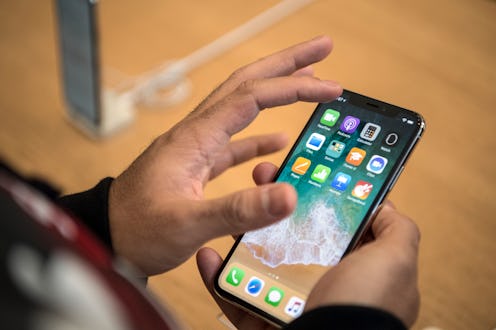Life
This Is Why Your iPhone Keeps Randomly Shutting Off By Itself

I became an iPhone convert several years ago, which means I've had one long enough to know that new iOS rollouts can be fraught with all kinds of issues. But the rollout of iOS 11 has seemed like even more of a nightmare than usual, from reports of users being unable to type "I" (oh, the irony) to more recent reports of people's iPhones repeatedly shutting down. If your phone is one of the devices affected, you may be wondering why your iPhone is crashing constantly and how to fix it. Thankfully, Apple Support has released some helpful info for folks struck by this bug, and other experts have been digging into what exactly is causing the shutoffs.
Tech site ZDNet provided a rundown of the issue, and it turns out the iOS 11.1 shutdowns seem to be caused by apps. What happens, essentially, is that when one of your apps creates a notification, the bug makes your phone's processor usage surge to 100 percent, which overloads your phone and makes it restart.
However, according to Reddit user bedwej, crashes are not caused by all apps; they're only caused by apps that generate local notifications. That means your social media notifications aren't part of this — it's only apps that "work on airplane mode," the user explained. When these apps push a notification, it crashes iOS Springboard (which is your home screen, with all your apps), and forces Springboard to restart.
The number of notifications you receive can change the amount of time your phone remains on without crashing, which is why some users are seeing their phones crash every few minutes, while others are suffering crashes within seconds of their phones booting up. FYI, this issue may also affect iPads, but that has not been officially confirmed. If your iPad seems affected, you can follow the iPhone fix instructions.
Originally, folks thought turning back the dates on their iPhones would be a viable solution to the issue, but bedwej pointed out there's issues with that solution, saying, "Many server calls will fail which means websites won't load correctly or at all, apps may not update or launch (twitter, whatsapp) and calendar events, reminders, and messages won't work" [sic].
What may be extra frustrating about this issue is that usual fixes aren't working. Things like turning your phone off and back on, hard-resetting your phone by holding down the power and home buttons, and reinstalling apps won't prevent Springboard from turning your phone off.
Bedwej suggested a couple of stopgaps to mitigate potential problems caused by the constant reloading. First is, of course, a full backup of your device. "Your phone is replaceable; your photos aren't," bedwej said. Also, if your phone is getting hot, which ZDNet said is often a precursor to it crashing, shut it off completely yourself.
For a complete fix to the problem, you're going to have to update your phone again; Apple rolled out iOS 11.2, which contains a solution to the bug. "Just update your phone" sounds simple, but not if you're still dealing with your phone overheating and powering off right after it's turned on. If you cannot force your phone to update, Apple has a few suggestions. First, if you can, turn off notifications for all the apps on your device. Go to Settings, then Notifications, and go through all your apps individually, turning off notifications for each and every one of them. After your notifications are off, restart your device and head back to Settings to update to 11.2.
Again, this may be difficult for someone whose device is going off within seconds of startup, so there's another way to update: iTunes. Make sure you've got the latest version on your computer, then connect your iPhone to your computer via USB cable. Check the device for available updates, and 11.2 should pop up. Apple says the download will keep going even if your phone continues to restart uncontrollably.
And as soon as all our phones are restored to working order, we should send up a prayer hands emoji that the next iOS rollouts go much more smoothly.